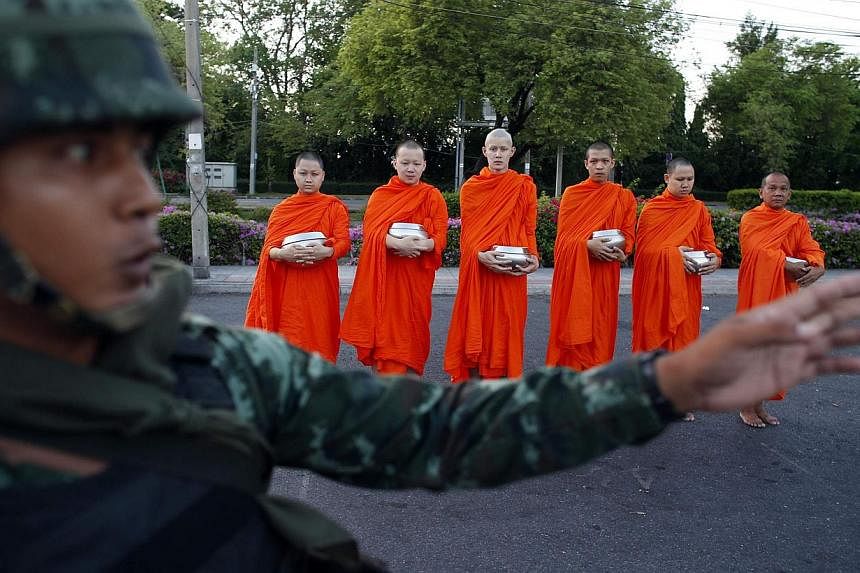Seizing power when all major political faction leaders were in the same room was the easy part, analysts say. What comes next for Thailand, however, will be more complicated, and the consequences could be grave.
The first order of business is likely to be the speedy appointment of a new prime minister.
Shortly after announcing on television at 5pm yesterday that it had seized power, the army followed up by suspending the Constitution. This removed the legal obstacle that was preventing the Senate - the last legislative body remaining after Parliament was dissolved last December - from proposing a new, non-elected prime minister to the King.
"The army has given (anti-government protest leader) Suthep Thaugsuban the victory he wanted," said Mr Sunai Phasuk, senior Thailand researcher for the independent Human Rights Watch.
The detention of Democrat Party figures like its leader Abhisit Vejjajiva, and of Mr Suthep and other People's Democratic Reform Committee (PDRC) leaders, was just for show, he said.
"Now it is going to be suppression," Chulalongkorn University professor of political science Pitch Pongsawat predicted in a phone interview. "The army will not contain the red shirts any more. They will suppress them. It will be General Prayuth Chan-ocha's version of peace."
But he warned: "The military can't rule the people; they need the legitimacy and they don't have it."
Analysts - and Gen Prayuth himself - have long warned that the staging of a coup d'etat will have serious repercussions. Leaders at all levels of the pro-government "red shirt" movement have long warned that there would be resistance in the event of such a move.
The red shirts who helped sweep billionaire Thaksin Shinawatra's party to power in the 2011 elections have firmly maintained that appointing a non-elected prime minister would be unacceptable.
Sources say militant red shirt groups will resist an army coup. But in recent weeks, the army has made some inroads against red shirt militant groups, when they discovered weapons caches.
Most importantly, the political battle is seen as a proxy war for the future of Thailand, and the future role of the monarchy itself. At stake is control of the country at a time when King Bhumibol Adulyadej, who has ruled for close to 70 years, is a frail 86.
There are anti-monarchy elements among the red shirts, and, in recent weeks, the movement has controversially been trying to align itself with Crown Prince Maha Vajiralongkorn, the heir to the throne.
Political scientist Panitan Wattanayagorn, also from Chulalongkorn University and a one-time spokesman for Abhisit, told The Straits Times: "The coup wasn't surprising, though the timing was maybe too soon; we were hoping the military would have more patience for a few more days, to allow negotiations."
In a phone interview after the army's lightning power grab yesterday in which Abhisit was among those "detained", Dr Panitan said: "When you abolish the Constitution, it is up to the coup group to define the rules and regulations. They have said the Senate and independent agencies will stay in place, but the question is on what basis."
More important is the political direction, he said.
"There will be resistance, not only from groups of citizens, but from within the security establishment itself. It will not be immediate because this has been very sudden; they will have to make calculations. And the longer the uncertainty continues, the stronger it will be," said Dr Panitan.
"The military has to come up with quick solutions, like a timetable for elections."
Mr Chaturon Chaisang, a senior Cabinet member of the ousted government, told The Straits Times shortly after the coup d'etat: "The martial law declaration was totally illegal, so they had to go further. But they will not be able to explain this to the people.
"People expected martial law to bring peace, but the coup has destroyed those expectations. People will be careful at first because of martial law. Then they will figure out what to do. In a short time, there will be trouble."

